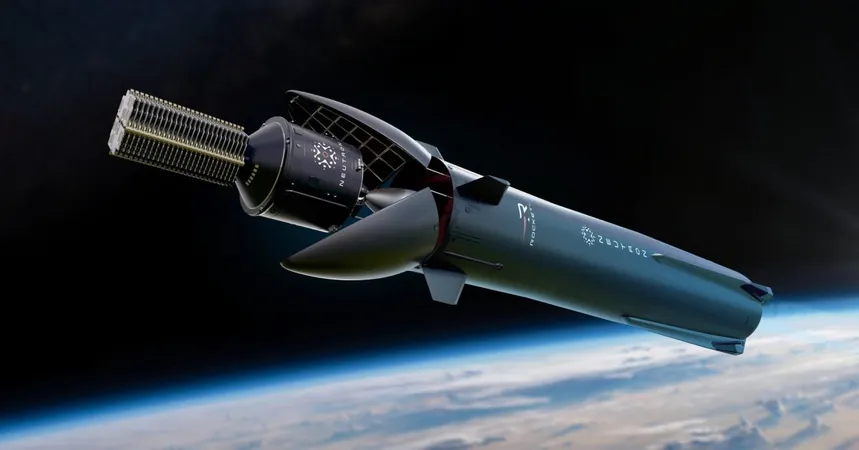
Rocket Lab Unveils Revolutionary $2B Plan to Accelerate Mars Sample Return as NASA Reviews Proposals
2024-10-24
Author: Li
NASA's Mars Sample Return Mission
NASA is gearing up for a transformative leap in its Mars Sample Return (MSR) mission, with the agency's leaders keen on curtailing costs and speeding up the return of Martian samples. On October 15, NASA wrapped up its examination of twelve contracted studies, which were aimed at discovering alternative strategies for the ambitious mission.
Innovative Proposals and Rocket Lab's Plan
According to Jeff Gramling, the MSR program director, these studies are now under rigorous review, with a conclusive decision anticipated by the end of 2024. The ultimate aspiration is to devise a method for bringing back Martian samples by 2040, ideally keeping the budget under $11 billion—a figure derived from a 2023 Independent Review Board assessment that scrutinized NASA's existing plans.
Among the innovative proposals set forth, Rocket Lab's plan stands out. The company has been commissioned to explore a streamlined, economically viable mission design. Their proposed architecture involves the use of two Neutron rockets: one designated to launch an Earth Return Orbiter and the other tasked with delivering a lander equipped with a Mars Ascent Vehicle.
Sample Collection and Return
This ingenious lander would be responsible for retrieving up to 30 sample tubes curated by NASA’s Perseverance rover, which has been exploring the Martian landscape since 2021. Once collected, these samples would be launched into orbit, where the Earth Return Orbiter would rendezvous with them, initiating their journey back to Earth. Rocket Lab ambitiously aims to return these samples as early as 2031, all for an estimated cost of under $2 billion.
Rocket Lab's Experience and Commitment
Rocket Lab's burgeoning experience in interplanetary missions gives them a significant edge in the MSR project. The company has previously collaborated with NASA on several notable missions, including the CAPSTONE lunar endeavor and the forthcoming ESCAPADE mission to Mars.
Peter Beck, CEO of Rocket Lab, emphasized the company's commitment to delivering a low-cost and rapid Mars Sample Return, stating, “We have been methodically implementing a strategy for cost-effective planetary science in recent years. Our previous missions demonstrate our capability to execute a complex mission like Mars Sample Return efficiently.”
Challenges and Industry Collaboration
NASA’s original design for the MSR program encountered significant challenges due to its intricate structure, which involved the coordination of three separate spacecraft: a lander, drones to collect samples, and a return orbiter. In April, the agency shifted its focus by seeking simplified proposals from industry leaders to maintain scientific objectives while enhancing efficiency. Rocket Lab emerged as a frontrunner, joining proposals from eight other influential firms, including SpaceX and Lockheed Martin.
Future Assessments and Recommendations
Looking ahead, a strategy review team led by former NASA Administrator Jim Bridenstine is slated to assess these various proposals, with a final recommendation expected by December. The ultimate mission framework could merge insights from multiple studies, aiming to harmonize cost, risk, and timeline.
Conclusion
As NASA Administrator Bill Nelson aptly remarked, “The Mars Sample Return mission signifies an unprecedented endeavor: launching a rocket from another planet to safely bring samples back to Earth from over 33 million miles away. Diverse perspectives are crucial in this process, and it is imperative that we execute the mission in the most cost-effective and efficient manner possible.”
As this groundbreaking mission progresses, the implications for planetary science and the quest to uncover the secrets of Mars are profound, potentially transforming our understanding of the Red Planet and our place in the universe. Stay tuned for further updates on what could be one of humanity’s most exciting scientific undertakings yet!






 Brasil (PT)
Brasil (PT)
 Canada (EN)
Canada (EN)
 Chile (ES)
Chile (ES)
 España (ES)
España (ES)
 France (FR)
France (FR)
 Hong Kong (EN)
Hong Kong (EN)
 Italia (IT)
Italia (IT)
 日本 (JA)
日本 (JA)
 Magyarország (HU)
Magyarország (HU)
 Norge (NO)
Norge (NO)
 Polska (PL)
Polska (PL)
 Schweiz (DE)
Schweiz (DE)
 Singapore (EN)
Singapore (EN)
 Sverige (SV)
Sverige (SV)
 Suomi (FI)
Suomi (FI)
 Türkiye (TR)
Türkiye (TR)